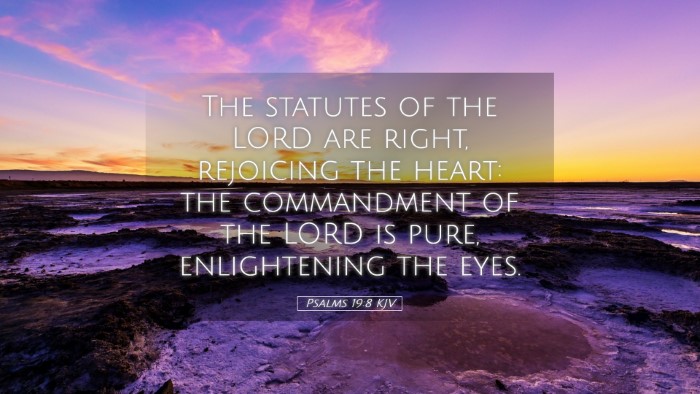Commentary on Psalms 19:8
Psalms 19:8 reads: "The statutes of the Lord are right, rejoicing the heart: the commandment of the Lord is pure, enlightening the eyes."
Introduction
This verse highlights the value and impact of God's statutes and commandments on the believer's life. Across different public domain commentaries, the emphasis is placed on the transformative nature of divine law which not only guides moral conduct but also fuels inner joy and spiritual enlightenment.
Exegesis
The psalmist here presents a robust affirmation of God's law. The terms "statutes" and "commandments" are significant in that they imply a deep, principled framework for living.
Insights from Matthew Henry
Matthew Henry asserts that God's statutes are not arbitrary, but they are "right," aligning with divine wisdom and moral order. He elaborates that they bring rejoicing to the heart, as true happiness stems from obedience to God. The "commandment of the Lord" is described as "pure," which suggests that it is untainted by human motives and is wholly devoted to leading mankind toward righteousness.
He emphasizes that this commandment provides clarity to one's understanding, making the eyes of the spiritual seeker bright and vibrant. Henry asserts that the purity of God's command leads to a robust spiritual vision, illuminating the path for believers.
Insights from Albert Barnes
Albert Barnes reinforces the idea that the statutes of the Lord are “right,” meaning that they are in accordance with truth. Barnes explains that the “rejoicing of the heart” mentioned here refers not merely to joy, but to a profound sense of satisfaction and tranquility that accompanies observing God's law. He points out that divine commandments are enlightening, providing knowledge and discernment that impact one's moral choices.
Barnes draws attention to the dual nature of this enlightenment—it is both intellectually illuminating and morally transformative. The commandment serves to guide the believer away from the pitfalls of life and toward the enlightenment that brings true understanding of God's nature.
Insights from Adam Clarke
Adam Clarke provides a deep examination of the terms "right" and "pure." He notes that "right" implies conformity to a standard of righteousness, established by God Himself. For Clarke, the resultant joy is an innate response to aligning oneself with that standard. He elaborates on the idea that divine statutes are not only an ethical code but also a source of inner joy and motivation for living.
Furthermore, Clarke emphasizes the word "enlightening" in relation to spiritual insight. He explains that the commandments allow for a clearer understanding of life’s purpose, providing believers with the wisdom to discern between good and evil. This enlightenment, he argues, is vital, especially in a world filled with moral ambiguity.
Theological Implications
This verse underscores a central truth in biblical theology: God’s law is inherently good and beneficial. The affirmations made in this scripture show that divine statutes are pathways to spiritual fulfillment and moral clarity. Believers should reflect on their laws not just as regulations, but as a means of experiencing joy and enlightenment.
There exists a divine order that finds expression in God's commandments, which when followed, leads to righteousness and joy. Hence, this verse could serve as a fundamental teaching point for pastoral counsel and theological discourse.
Practical Applications
- Reflection on God’s Law: Pastors are encouraged to invite their congregations to spend time in reflection upon the statutes and commandments of God, recognizing their significance in daily life.
- Teaching Joy in Obedience: There can be an emphasis on the joy that accompanies a life lived according to God’s will, countering the misconception that obedience is burdensome.
- Encouraging Spiritual Insight: The enlightening nature of commandments can be highlighted in sermons, encouraging believers to engage with scripture for holistic understanding.
- Moral Discernment: Foster discussions about the importance of discernment based on God’s commandments, especially in a world facing significant ethical challenges.
Conclusion
Psalms 19:8 captures the essence of how God's laws are not just rules but are life-giving truths that shape the believer's experience of joy and understanding. The insights from Matthew Henry, Albert Barnes, and Adam Clarke provide rich interpretations that affirm the timeless relevance of this verse. As pastors, students, and scholars engage with this scripture, may they find renewed motivation to seek God's statutes, to rejoice in their hearts, and to pursue enlightenment through His commandments.


